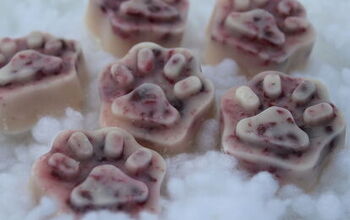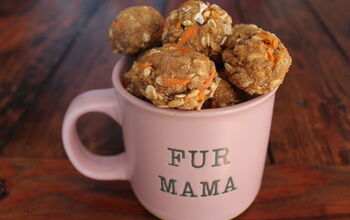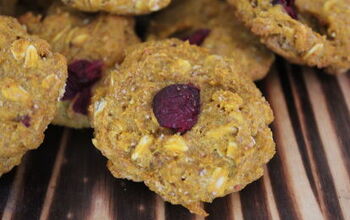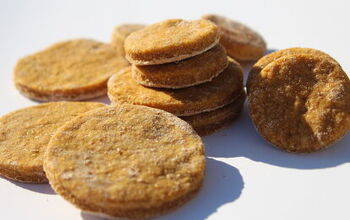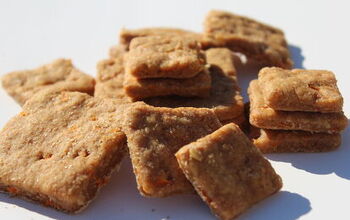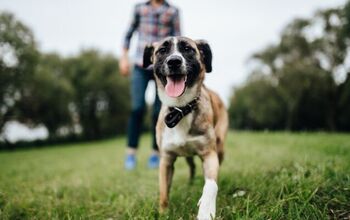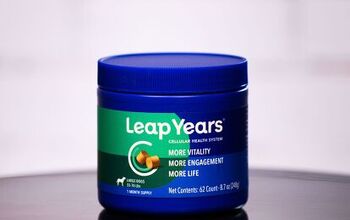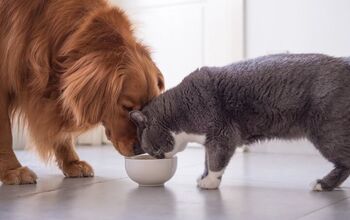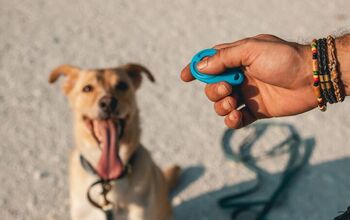Orange Cranberry Dog Treat Recipe

Orange you glad that we added a citrus zing to our latest recipe offering? With a Vitamin C boost, these cookies are a little bit of sunshine in every bite!
I’ve been posting recipes to PetGuide.com for almost three years and never once I have used oranges! When I realized this, I knew it was time to rectify the matter. Ta-da – my Orange Cranberry Dog Treat Recipe! I love the smell of citrus wafting through my house… and Oscar loves chowing down on these treats. It’s a match made in heaven!
Orange Cranberry Dog Treat Recipe
Makes 25 cookies
Ingredients:
1 orange, zested and juiced
1/2 cup dried cranberries
1 egg
1/4 cup honey
2 cups flour (any type)
1 cup rolled or whole oats, ground
1/2 teaspoon vanilla extract
Directions:
- Preheat oven to 400°F. Line cookie sheets with parchment paper.
- In a blender or food processor, grind rolled or whole oats for 40 seconds.
- Combine flour and oats in bowl and set aside.
- Dice dried cranberries into smaller pieces and add to dry mixture
- Add egg, vanilla extract and honey to bowl and mix well.
- Grate or zest the orange peel, and add to mixture.
- Slice orange in half. Squeeze juice into bowl – don’t worry if pulp gets into the dough, however, if any seeds fall in, remove them before baking.
- Knead dough into ball. Split the dough into 4 or five smaller balls. Roll each ball onto a flat countertop covered with parchment paper and roll to ¼ to ½ inch thickness.
- Place in oven and bake for 10 to 12 minutes.
- Remove from oven and let cool for 1 to 2 hours.
- Place in air tight container or bag and keep in refrigerator or freezer until needed.
Are Oranges Good for My Dog?
You may have heard someone warn you that you shouldn’t feed your dog citrus. The truth is it carries some great health benefits in moderation! Oranges are non-toxic but, like any fruit, the naturally high sugar content can create problems. In addition to natural sugars, oranges are also packed with some great nutritional quality. They are high in vitamin C, potassium, and dietary fiber.
The most recognized of those is the vitamin C content, often recommended for boosting the immune system and fighting off illness. In addition to supporting your dog’s immune health, vitamin C is a powerful antioxidant that helps to slow the decline in cognitive health that is often seen with age and reduce inflammation. This makes it a great choice for dogs as they are aging.
Potassium is an important part of your dog’s diet, helping with the regular function of the heart, muscles, and nerves. It also helps the digestive system to absorb nutrients faster, getting the most out of your carefully chosen diet.
Finally, dietary fiber is essential for your dog’s digestive health. It is necessary in balancing gut health. This includes regulating the bowels, improving the health of the colon, bulking up stool, and slowing the speed that food moves through the digestive system to increase the absorption of nutrients. Eating high-fiber food and treats is also a great way to help your dog lose weight as it helps your dog feel full longer. This means your dog will need to eat less to feel content, making it easier for you to monitor and limit calorie intake.

Amy Tokic, Editor of PetGuide.com, is a passionate animal lover and proud pet parent of Oscar, a Shih Tzu/Chihuahua cross, and Zed, a Japanese Chin. Her love of animals began in kindergarten, when she brought her stuffed dog Snoopy into class with her every day. Now, she writes about her adventures in pet ownership and tirelessly researches products, news and health related issues she can share with other animal enthusiasts. In her free time, Amy loves perusing used book and record stores, obsessing over the latest pet products available and chasing squirrels with wild abandon (a habit attributed to spending too much time with her pooches).
More by Amy Tokic







